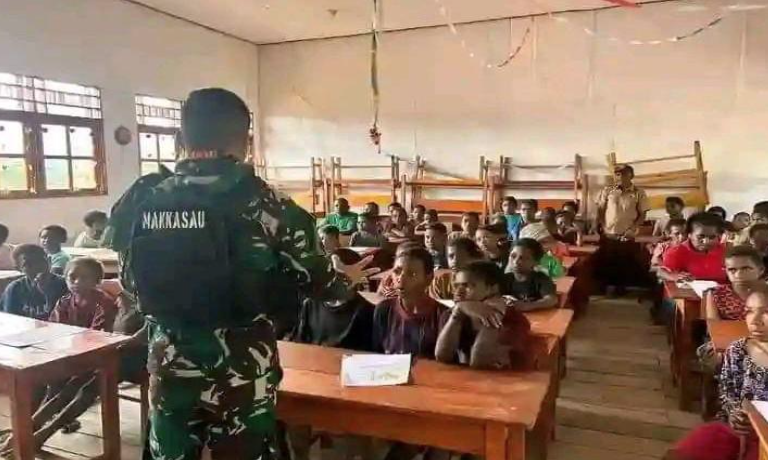Building a Future Amongst Uncertainty
The dire humanitarian crisis in West Papua
By Holakola Kuti
West Papua is an anomaly that exists in the Pacific Region. An area known as a safe, peaceful, and friendly region with people who strongly value their ancestral traditions and cultural heritage. The land of Papua is the only region inhabited by Melanesian people whose territory continues to be engaged in a prolonged conflict. West Papua is kept away from the spotlight intentionally–its existence often denied and neglected by their own brothers and sisters in the Pacific. The presence of Western colonialism in the region began with the Netherlands and continued with Indonesia, which forced the fake Act of Free Choice, a fraudulent power exchange. This is the history behind the bloodshed and prolonged conflict that continues to occur today.
Since the occupation of West Papua by Indonesia in the early 1960s, the living conditions of the Papuan Indigenous People have not changed. Military operations beginning in the 1960s continue today, causing a compiled humanitarian crisis of silent deaths, flash killings, disappearing people, extreme poverty, high mortality rates, and a slow-motion genocide that has been kept hidden for years. These human tragedies are not stories from the past, but our daily realities.
History has recorded that West Papua is an area inside Indonesia with the longest Military Operation Area since the late 1960s up to now. West Papua is known as the most militarized area in Indonesia. The different perspectives on the status of West Papua inside Indonesia have deeply affected our lives as Indigenous West Papuans. The Indonesians consider the integration as final, whereas West Papuans consider this as a historically illegal occupation. These two clashing perspectives that have never been openly reconciled have resulted in the current prolonged humanitarian crisis.
It was this arbitrary decision on West Papua’s fate, made by foreign nations, that would cause millions of West Papuan lives to be lost. It caused never-ending bloodshed, scattered mass graves, bleak futures for young generations, silenced voices, and forcibly extinguished dreams.
Our nation’s history was obscured by other nations and facilitated by the UN. For these reasons, the voices and support of our brothers and sisters in the Melanesian region are very important in order to bring the West Papua case to be discussed again in the UN General Assembly. That is why the nation that colonized us bribed so many countries in the world to shut their mouth and ears, close their eyes, and turn their backs on the situation in West Papua. This is an attempt to continue to bury our history; to bury us alive in front of the world.
Entering the year 2025, the situation is getting more difficult for us in West Papua. We hear, read, and witness people die without reason. Death from medical malpractice in hospitals, from food and drink poisoning, and from starvation in remote villages where the military prevents local people’s access to their gardens. The death rate is rocketing for these reasons, and few preventive steps are being taken by the local or central government. The situation has become catastrophic, and it demands a comprehensive and humane approach to reducing these ongoing human rights violations. But again, the Indonesian government chose the same decision they have been making for years: to send more military personnel to the land of Papua.
Now, we witness the deployment of joint forces (TNI/POLRI) all across Papua, which has only escalated the violence. By treating increased military surveillance as the solution, control is prioritized over peaceful ways to address the crisis. The heavy presence of military personnel does not solve the humanitarian crisis. It worsens an already bad situation. Since December 2018, more military personnel have been sent across Papuan soil, and this has created more unresolved issues in several areas, such as Nduga, Intan Jaya, Yahukimo, Maybrat, Pegunungan Bintang, Puncak, and Puncak Jaya.
It was in these areas that the Indonesian military encountered the strongest resistance from the Indigenous West Papuan guerrilla fighters which are known widely as the Papuan National Liberation Army (TPN/OPM). These areas are full of mineral wealth that the Indonesian government wants to take and control under the pretext of eradicating the separatist movement. This armed conflict resulted in the mass displacement of 106,000 Indigenous West Papuans, mostly women and children. People were forced to flee to the jungle or the nearest towns and regencies to protect their lives.
As generally happens in conflict-torn areas, women and children in West Papua have become victims of the turmoil. This situation has resulted in poor living conditions for the women and children in these areas, causing them not to be able to access proper education and health services. This prolonged conflict situation has sacrificed the fate and future of our children for several reasons.
First, children who come from conflict areas experience psychological trauma. We see situations where children run when they see people in military uniform approaching them. We know that pressure and trauma, if not handled professionally, can have long-term impacts on the child. Next, Indonesia's new TNI law, enacted in 2025, allows active-duty soldiers to be involved in civilian life. This law enables soldiers to become teachers or instructors, replacing professional teachers in schools. The armed soldiers roam around our children's schools, teaching our children in complete combat gear. The strange thing is that this situation only exists in West Papua but cannot be found in other parts of Indonesia—a direct portrayal of Indonesia's colonialism in West Papua. Third, the children in conflict areas cannot receive a proper education because many school buildings are used as military bases. This situation has caused most children in the conflict areas to become school dropouts. The fourth reason is that most military personnel’s educational level does not go beyond high school. In short, soldiers are not trained or qualified to teach, and their knowledge and expertise on subjects is highly questionable. No parent would entrust their children's future to the hands of irresponsible people. The last reason is that many internally displaced teenage boys face the risk of being tortured or shot by the Indonesian military, so they instead choose to flee to the jungle and join the Papuan National Liberation Army (TPN/OPM).
Our children’s basic rights to have a good and proper education in a peaceful and safe environment are denied by the state completely. The future of our children is indeed bleak. Surely, it can be predicted that in the next 10 or 20 years, the literacy rate in Papua will decrease sharply.
It is mandatory for every state to ensure that its citizens' basic rights, such as access to health services, the opportunity to get a proper education, are fulfilled. Furthermore, every government has obligations to Respect, Protect, and Fulfill its citizens’ basic human rights. Respect means refraining
from actively violating human rights, protect means acting to prevent violations by third parties, and fulfill means acting to attain the most rapid enjoyment of rights of all (by appropriate legislative, administrative, budgetary, and other positive means).
However, in West Papua, there is no guarantee for us to live in a safe and peaceful situation. We can say that, as adults, we are sure about our future. But how about our children, who are still innocent and do not understand how critical the situation is? Should we tell them the facts and kill their dreams, or keep convincing them that they must retain hope?
When writing this, I read several prominent Indonesian news headlines about promises made by the Indonesian President to provide scholarships to thousands of young students in the Pacific. I was wondering about the fate of the thousands of West Papuan children who are now unable to attend schools because they were forced to live as IDPs on their land. Instead of solving our urgent problems today, the Indonesian government prefers to throw money elsewhere and give grants to support foreign people's children. We are left to solve our problems alone, while our resources that could have financed our future generations are depleted without our consent. The same government that has campaigned that West Papua is a part of their territory, now chooses to provide scholarships for Pacific students for their political interests, whilst abusing the dreams of West Papuan children. Our land and natural environment were destroyed, our wealth was stolen, and the future of our children is buried before the eyes of the whole world.
The world is now watching: the bloodshed that happened on our land is no longer a secret to our brothers and sisters in Melanesia and the Pacific, but still our voices seem to hit a thick wall. Over time, we learned how money can buy conscience, turning friends and relatives into enemies. We also learned that no friendship lasts forever when it comes to personal interests.
My heart aches when I read the news while seeing innocent children running, laughing, and chasing each other. I can see their sparkling eyes full of hope and joy. They compete to answer the adults’ questions, "What do you want to be when you grow up?” They will answer it enthusiastically, saying I want to become a police officer, or a governor, a regent, or a nurse, and so on. A perfect dream about a bright future. But we know that when they grow up, their future is uncertain—many of them could die at any time from the stray bullets fired by thieves and robbers who are ravaging our country, West Papua.
"Ashes of Tomorrow"
They once drew stars on paper walls,
Chalked sunlit dreams in dusty halls.
Now shattered glass and sirens scream
Where once they chased a simple dream.
No lullabies, no evening light—
Just thudding boots and endless nights.
Their laughter drowned by drones above,
A world devoid of peace or love.
A ragged doll, a broken shoe,
Are all the toys that war leaves true.
Their classrooms crushed, their stories torn,
Their childhoods are lost before they're born.
They speak in whispers, eyes grown old,
Too young to carry hearts this cold.
No fields to run, no place to hide—
Just prayers that cease when bombs collide.
And yet, within the ash and stone,
A spark remains, though left alone.
A dream half-buried, barely whole—
The silent echo of all pure souls.
★★★★★





